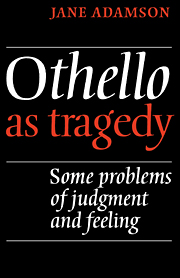Book contents
- Frontmatter
- Contents
- Preface
- Introduction
- 1 The ‘comforts’ of praise and blame
- 2 ‘Injuries’ and ‘remedies’: the first two acts
- 3 ‘Pluming up the will’: Iago's place in the play
- 4 Personal and professional identity: Othello in the first two acts
- 5 ‘Alacrity in hardness’: Othello's crisis in Acts III and IV
- 6 The ‘hollow hell’ of vengeance: Othello's attempted remedies
- 7 Self-charity and self-abnegation: the play's women in love
- 8 The ‘power to hurt’ and ‘be hurt’, ‘past all surgery’: the final scene
- Frontmatter
- Contents
- Preface
- Introduction
- 1 The ‘comforts’ of praise and blame
- 2 ‘Injuries’ and ‘remedies’: the first two acts
- 3 ‘Pluming up the will’: Iago's place in the play
- 4 Personal and professional identity: Othello in the first two acts
- 5 ‘Alacrity in hardness’: Othello's crisis in Acts III and IV
- 6 The ‘hollow hell’ of vengeance: Othello's attempted remedies
- 7 Self-charity and self-abnegation: the play's women in love
- 8 The ‘power to hurt’ and ‘be hurt’, ‘past all surgery’: the final scene
Summary
Although Othello, unlike Coriolanus, is generally considered one of the great Shakespearean tragedies, it is also quite widely thought to be the most limited of them. For anyone like myself who does not share that limiting view of it, the prime critical task must therefore be to explain why not – to explain how the play is tragic in the fullest sense of the word, and why its alleged limitedness’ is actually the reflection of the reader's own rather cramping moral and artistic preconceptions.
We can see clearly enough the disabling effect of such preconceptions in the views of earlier times – Rymer's is only the most notorious case – yet it is probably no less in our own. To a quite peculiar extent, the growing mass of commentary about Othello in recent decades seems to have become stuck in old ruts, old debates and circularities. Particular aspects of the play have been written about very finely, of course; nevertheless, we do not seem to be much closer to any generally shared understanding of it as a whole. As with no other of Shakespeare's tragedies, criticism of this one seems to have become arrested or split into two intransigent camps – not, I think, because of any special daftness in Othello's very various readers, but because of certain essential features of the play itself.
- Type
- Chapter
- Information
- Othello As TragedySome Problems of Judgement and Feeling, pp. 1 - 10Publisher: Cambridge University PressPrint publication year: 1980



